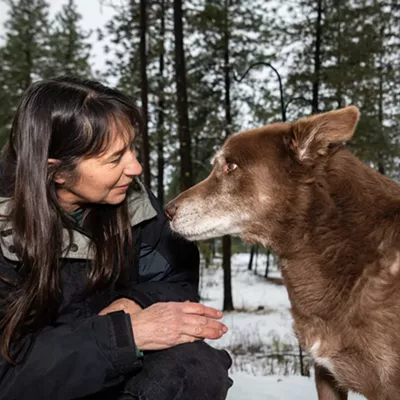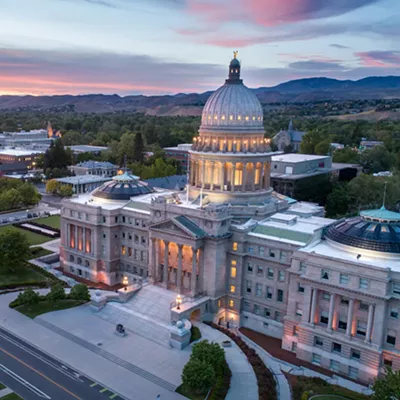Saving Rock Creek
[
{
"name": "Broadstreet - Instory",
"component": "25846487",
"insertPoint": "4",
"requiredCountToDisplay": "4"
},{
"name": "Broadstreet - Empower Local",
"component": "27852456",
"insertPoint": "8",
"requiredCountToDisplay": "8"
},{
"name": "Broadstreet - Instory",
"component": "25846487",
"insertPoint": "12",
"requiredCountToDisplay": "12"
},{
"name": "Broadstreet - Instory - 728x90 / 970x250",
"component": "27852677",
"insertPoint": "18",
"requiredCountToDisplay": "18"
},{
"name": "Broadstreet - Instory",
"component": "25846487",
"insertPoint": "5th",
"startingPoint": "23",
"requiredCountToDisplay": "24",
"maxInsertions": 100
}
]
by Rick Bass
Back in the days when I worked as a geologist, I remember realizing more than once how much the earth is a living organism, that it is not simply a carapace of ancient stone, but a living body that stretches, slips and slides, flexing and contracting with its own varied respiration.
Another thing I remember from my past are the occasions when industry representatives would argue with local landowners, saying as they pumped oil out from underneath the landowners' farms and ranches that the land above these deposits would never slump or subside -- never. Though of course it did.
Up in the far northwest corner in the lower 48, along the narrow spine of rock and ice and dense green forest that straddles the Montana and Idaho border, a section of the Cabinet Mountains is, I fear, about to collapse -- literally. And with that crumpling, I fear the leave-taking not just of spectacular mountain scenery but also the essence of the wilderness itself: the wild creatures that inhabit the refuge of the Cabinet-Yaak ecosystem.
A mining company with a checkered past and new friends in the White House wants a permit to place one of the world's largest copper and silver mines in the headwaters of one of the wildest and least touched streams in this region, Rock Creek.
Sterling Mining is arguing that even though it is illegal to mine in a federally protected wilderness area, a loose interpretation of the 1872 Mining Act will allow them to tunnel under the surface of the wilderness, and to carve out and carry away the stone heart of the mountain. The project would also set up a toxic waste impoundment right on the wilderness border, in the valley of the Clark Fork River, which empties into Lake Pend Oreille.
Sterling would also dispose of up to 3 million gallons of waste per day into the Clark Fork River, which, ironically, after being heavily poisoned by decades of other mining activities, has only recently achieved a "clean" status. The new proposed mine would eventually create a dumpsite covering half a square mile and standing 300 feet tall. That's 100 million tons' worth accumulating right next to Rock Creek.
The endangered bull trout in Rock Creek would have their survival threatened by the increase in water temperature brought about by the various pollutants and algal growth from such a mine. Grizzlies are also at risk. For years, scientists have been wary that isolated populations here are in danger of "blinking out," due to the ever-accumulating forces being applied against the bears.
There's a significant chance that blasting and digging beneath the wilderness would cause the previously impermeable strata that support the overlying wilderness lakes to collapse and drain away down into the mountain. Some of us also fear that underground blasting and gutting could create new fractures along the exterior cliffs. That would allow new springs from which acid waters will seep and trickle, further despoiling what Congress voted to protect as wilderness.
The mining company assures us that nothing untoward will happen. They have, they say, everything under control.
Even if wilderness isn't perceived by everyone as a significant and lasting value unto itself, it's important to those who prefer an economic argument to remember that mining in the West provides only small change compared to what recreation and scenic value returns.
The fate of the downstream Clark Fork watershed, and the future of the many threatened species that are holed up in this pristine redoubt, rely upon the Forest Service, which will decide whether to issue a mining permit. The agency is in the spotlight here; its decision could literally move a mountain, eliminate lakes, blight rivers and streams, and push endangered species into oblivion.
The Forest Service can also make a choice that favors the future and turns away, finally, from what some critics call the agency's "lapdog of industry" reputation. The agency has the opportunity to let Rock Creek and the Cabinet Mountains Wilderness remain as they were created -- nothing more, but certainly, nothing less. F
Rick Bass is a contributor to Writers on
the Range, a service of High Country News
in Paonia, Colorado (www.hcn.org).
Rick Bass lives in Troy, Mont.
Back in the days when I worked as a geologist, I remember realizing more than once how much the earth is a living organism, that it is not simply a carapace of ancient stone, but a living body that stretches, slips and slides, flexing and contracting with its own varied respiration.
Another thing I remember from my past are the occasions when industry representatives would argue with local landowners, saying as they pumped oil out from underneath the landowners' farms and ranches that the land above these deposits would never slump or subside -- never. Though of course it did.
Up in the far northwest corner in the lower 48, along the narrow spine of rock and ice and dense green forest that straddles the Montana and Idaho border, a section of the Cabinet Mountains is, I fear, about to collapse -- literally. And with that crumpling, I fear the leave-taking not just of spectacular mountain scenery but also the essence of the wilderness itself: the wild creatures that inhabit the refuge of the Cabinet-Yaak ecosystem.
A mining company with a checkered past and new friends in the White House wants a permit to place one of the world's largest copper and silver mines in the headwaters of one of the wildest and least touched streams in this region, Rock Creek.
Sterling Mining is arguing that even though it is illegal to mine in a federally protected wilderness area, a loose interpretation of the 1872 Mining Act will allow them to tunnel under the surface of the wilderness, and to carve out and carry away the stone heart of the mountain. The project would also set up a toxic waste impoundment right on the wilderness border, in the valley of the Clark Fork River, which empties into Lake Pend Oreille.
Sterling would also dispose of up to 3 million gallons of waste per day into the Clark Fork River, which, ironically, after being heavily poisoned by decades of other mining activities, has only recently achieved a "clean" status. The new proposed mine would eventually create a dumpsite covering half a square mile and standing 300 feet tall. That's 100 million tons' worth accumulating right next to Rock Creek.
The endangered bull trout in Rock Creek would have their survival threatened by the increase in water temperature brought about by the various pollutants and algal growth from such a mine. Grizzlies are also at risk. For years, scientists have been wary that isolated populations here are in danger of "blinking out," due to the ever-accumulating forces being applied against the bears.
There's a significant chance that blasting and digging beneath the wilderness would cause the previously impermeable strata that support the overlying wilderness lakes to collapse and drain away down into the mountain. Some of us also fear that underground blasting and gutting could create new fractures along the exterior cliffs. That would allow new springs from which acid waters will seep and trickle, further despoiling what Congress voted to protect as wilderness.
The mining company assures us that nothing untoward will happen. They have, they say, everything under control.
Even if wilderness isn't perceived by everyone as a significant and lasting value unto itself, it's important to those who prefer an economic argument to remember that mining in the West provides only small change compared to what recreation and scenic value returns.
The fate of the downstream Clark Fork watershed, and the future of the many threatened species that are holed up in this pristine redoubt, rely upon the Forest Service, which will decide whether to issue a mining permit. The agency is in the spotlight here; its decision could literally move a mountain, eliminate lakes, blight rivers and streams, and push endangered species into oblivion.
The Forest Service can also make a choice that favors the future and turns away, finally, from what some critics call the agency's "lapdog of industry" reputation. The agency has the opportunity to let Rock Creek and the Cabinet Mountains Wilderness remain as they were created -- nothing more, but certainly, nothing less. F
Rick Bass is a contributor to Writers on
the Range, a service of High Country News
in Paonia, Colorado (www.hcn.org).
Rick Bass lives in Troy, Mont.
















